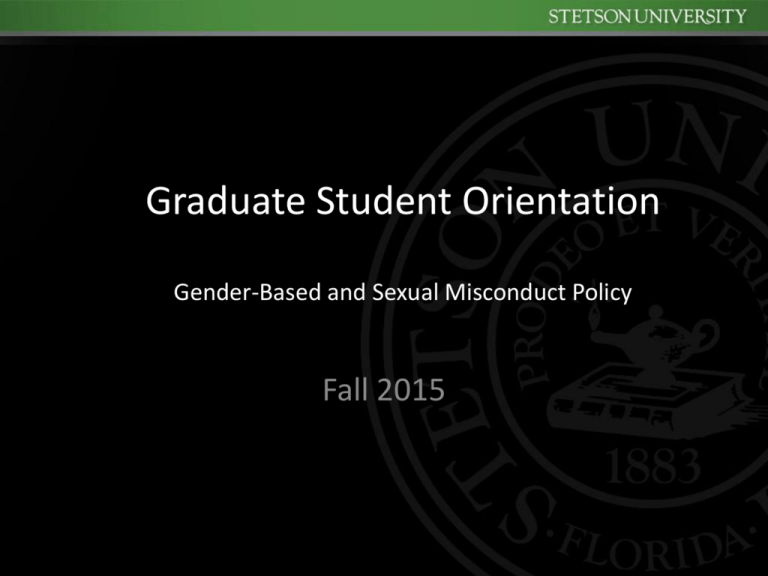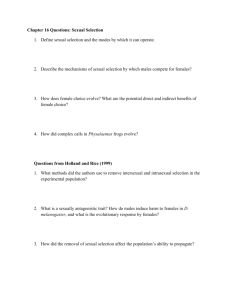
Graduate Student Orientation
Gender-Based and Sexual Misconduct Policy
Fall 2015
Why is this important?
• This presentation is designed to share important
information with our Graduate Student population as
we strive to provide an educational, safe and inclusive
environment at Stetson University.
• Information includes:
– policies specific to gender-based and sexual misconduct
discrimination
– student rights and responsibilities
– university and community resources
It is required by law that we share this information with
all students.
How does this impact me?
• By enrolling in Stetson University, you accept
the responsibility to become familiar with
University regulations, to comply with the
University’s authority, to respect the rights
and property of others, and to recognize that
your actions reflect upon the entire University
community.
Statement of Non-Discrimination
• It is the policy of Stetson University, in accordance with
federal and state law, to prohibit unlawful
discrimination.
• The University supports a zero tolerance policy against
discrimination by any agent or organization of Stetson
University for reasons of age, creed, race, ethnicity,
national origin, religion, gender, disability, immigration
status, marital status, political or social affiliation,
sexual orientation, gender identity, and gender
expression.
What’s Next?
• On the next few slides are important
definitions of behavior as outlined in the
Student Code of Community Standards.
• Below is a link to the complete document for
your reference:
http://www.stetson.edu/administration/commu
nity-standards/code-of-communitystandards.php
University Definitions
• “Sexual Misconduct” as defined by this policy
comprises a broad range of behavior that
includes, but is not limited to, sexual harassment,
sexual exploitation, and sexual violence.
• “Gender-Based Misconduct” includes
discrimination or verbal, non-verbal or physical
harassment, violence, or intimidation which is
based on the person’s gender but which is not
sexual in nature.
University Definitions
•
“Sexual Harassment” unwelcome conduct of a sexual nature.
Sexual harassment includes any unwelcome sexual advances or
requests for sexual favors, whether physical, written, verbal, or
visual towards another individual exclusive of gender or sex and
encompasses any other conduct of a sexual nature when:
– (i) submitting to such conduct is made either explicitly or implicitly a
term or condition of employment, academic decisions, or universitysponsored activities
– (ii) submitting to such conduct is used as the basis for employment or
academic decisions affecting the individual as an employee, student,
or participant in university-sponsored activities
– (iii) such conduct has the purpose or effect of substantially interfering
with an individual’s work performance or creates an intimidating,
hostile, or offensive working or learning environment
University Definitions
• “Sexual Violence” includes physical sexual acts perpetrated
against a person’s will or where a person is incapable of giving
consent. A number of different acts fall into this category,
including but not limited to, acts of non-consensual sexual
contact and non-consensual sexual intercourse such as rape,
sexual assault, sexual battery, sexual coercion, forcible
sodomy, forcible oral copulation, sexual assault with an
object, forcible fondling, and threat of sexual assault. All such
acts of sexual violence are forms of sexual harassment
covered under Title IX.
University Definitions
• “Non-Consensual Sexual Contact” means the deliberate
touching of a person’s intimate parts (including genitalia,
groin, breast, or buttocks), or clothing covering any of those
area(s) without consent, or using force to cause a person to
touch his or her own or another person’s intimate parts.
• “Non-Consensual Sexual Intercourse” means penetration
(anal, oral, or vaginal) by a penis, tongue, finger, or an
inanimate object that occurs without consent, however
slight the penetration, whether by an acquaintance or by a
stranger, that occurs without indication of consent of both
individuals, or that occurs under threat or coercion.
University Definitions
• “Sexual Exploitation” means taking sexual advantage of
another person without consent, including but not limited
to: causing or attempting to cause the incapacitation of
another person in order to gain a sexual advantage over
such other person; causing the prostitution of another
person; recording, photographing or transmitting
identifiable images of private sexual activity and/or the
intimate parts (including genitalia, groin, breasts or
buttocks) of another person; allowing third parties to
observe private sexual acts; engaging in voyeurism; and/or
knowingly or recklessly exposing another person to a
significant risk of sexually transmitted infection, including
HIV.
University Definitions
• “Consent” means words or actions that show a knowing and
voluntary agreement to engage in mutually agreed-upon
sexual activity.
– Consent cannot be gained by force, or by ignoring or acting in spite of the objections of
another.
– Consent to one form of sexual activity can never imply consent to other forms of sexual
activity.
– Consent is not the lack of resistance; there is no duty to fight off a sexual aggressor.
– Consent can be withdrawn at any time, as long as the withdrawal is clearly
communicated by the person withdrawing consent through words or actions.
– A person shall not knowingly take advantage of another person who has an intellectual
or physical disability, who is under the influence of prescribed medication, alcohol or
other chemical drugs, or who is not conscious or awake, and thus is not able to give
consent as defined above.
– Further, a person shall not physically or verbally coerce another person to engage in any
form of sexual conduct to the end that consent as defined above is not given.
– In addition, certain states have designated a minimum age under which a person cannot
give consent. In the state of Florida, the age of consent is 18.
University Definitions
• “Incapacitation” means the physical and/or mental inability
to make informed, rational judgments. Where alcohol (or
any other drug) is involved, one does not have to be
intoxicated or drunk to be considered incapacitated.
Incapacitation is determined by how the substance
consumed impacts a person’s decision-making capacity,
awareness of consequences, and ability to make informed
judgments. The question is whether the alleged student
knew, or a sober, reasonable person in the position of the
alleged student should have known, that the complainant
was incapacitated.
• “Force” refers to physical force, violence, threats,
intimidation, or coercion.
University Definitions
• “Domestic Violence” refers to threats, attempts or acts of
emotional, physical, sexual, or psychological abuse which create or
maintain a degrading environment committed by the victim’s
current or former spouse, cohabitant, coparent, or person similarly
situated under domestic or family violence law, or anyone else
protected under domestic or family violence law.
• “Dating Violence” refers to violence by a person who has been in a
romantic or intimate relationship with the victim. The existence of
such a relationship will be gauged by its length and type, and
frequency of interaction.
• “Stalking” means a course of conduct directed at a specific person
that would cause a reasonable person to fear for their or others’
safety, or to suffer substantial emotional distress.
FL State Statue Definitions
•
“Sexual Battery” means oral, anal, or vaginal penetration by, or union with, the sexual organ
of another or the anal or vaginal penetration of another by any other object; however, sexual
battery does not include an act done for a bona fide medical purpose. (F.S.S. 794.011)
•
“Domestic Violence” means any assault, aggravated assault, battery, aggravated battery,
sexual assault, sexual battery, stalking, aggravated stalking, kidnapping, false imprisonment,
or any criminal offense resulting in physical injury or death of one family or household
member by another family or household member. (F.S.S. 741.28)
•
“Dating Violence” means violence between individuals who have or have had a continuing
and significant relationship of a romantic or intimate nature. (F.S.S. 784.046)
•
“Stalking” means willfully, maliciously, and repeatedly following, harassing, or cyberstalking
another person. For purposes of clarity, “harass” means to engage in a course of conduct
directed at a specific person which causes substantial emotional distress to that person and
serves no legitimate purpose. (F.S.S. 784.048)
Gender Based & Sexual Misconduct Policy
• Applies to allegations against a university student,
regardless of where the alleged sexual
misconduct occurred.
• Depending on the situation, students may face
both criminal and/or civil proceedings. This does
not directly impact the university’s process and
the university still has a responsibility to
investigate and remedy, regardless of the status
of any criminal and/or civil proceedings.
Reporting Options
• Confidential reporting options at Stetson:
– Counseling Center, Student Health Services or
University Chaplain
– Please note that these staff members are able to
maintain confidentiality within limits. They are
required to violate confidentiality for the
following:
• If there is abuse or endangerment of a minor
• Threat to harm self or others
• Court Subpoena
Formal Reporting Options
• Public Safety is available 24 hours a day, 365
days a year.
– Local law enforcement will also be notified
– Complainant chooses if they want make a
statement or pursue charges
– Report then gets forwarded to the Title IX Deputy
Coordinator for Students for follow-up
• Report on-line stetson.edu/reportit
Be an Empowered Bystander
• Many situations of gender based or sexual
misconduct are often witnessed by others
• At Stetson, we encourage the “Empowered
Bystander” model
– See something, say something
– Your safety must come first
How to Reduce your Risk
• The vast majority of sexual assaults on college campuses involve alcohol &
individuals who know each other
• Use the buddy system
• Trust your instincts
• Don’t leave drinks unattended
• Think about your online profile safety- what can people find out about you
online?
• Be aware of your surroundings
– Know where blue emergency lights are on campus
– Avoiding walking campus with headphones on
– Put Public Safety’s number in your phone now: 386-822-7300
• Be part of culture change
Warning Signs of Abusive Behavior
• Threatens abuse or
violence
• Breaks objects
• Use of force during
arguments
• Jealousy
• Controlling behavior
• Unrealistic expectations
• Isolation
• Hypersensitivity
• Cruelty to animals or
children
• Rigid sex roles
• Mood swings
• Blames you (or someone
else) for everything
• Resentful
• Superiority
• Deceitful
• Criticizer
Don’t minimize boundary violations!
If something doesn’t feel right, say something…reach out for help.
Options for Assistance
• If you or someone you know may be the victim of any form
of gender-based or sexual misconduct, you are strongly
encouraged to seek immediate assistance.
• Your first priority should be to get to a place of safety.
• If it was a physical assault, you should then obtain
necessary medical treatment as soon as possible in order to
prevent or treat sexually transmitted diseases and screen
for the presence of any date rape drugs.
• Undergoing a medical examination is also critical to
preserving evidence and is a time-sensitive process. Exams
can typically be conducted up to five days from the date of
the incident, but you are encouraged to seek assistance as
soon as possible to prevent the loss of evidence.
Resources and References 24/7
•
•
•
•
•
•
•
•
•
•
•
Stetson University Public Safety: (386) 822-7300
Stetson On-Call Professional Staff: (386) 747-9871
DeLand Police Department: 911
DeLand Police Department Victim Advocates: (386) 801-5605
Florida Hospital, DeLand: (386) 943-4650
Domestic Abuse Council - (386-255-2102 - 24 hour confidential hotline)
www.domesticabusecouncil.com
Family Life Center - (386-437-3505 - 24 hour confidential hotline)
www.familylifecenter.org
Betty Griffin House: (904) 824-1555
National Sexual Assault Hotline: 1-800-656-4673
National Domestic Violence Hotline: 1-800-799-7233
National Dating Abuse Hotline: 1-866-331-9474
Resources and References
• University Title IX website:
http://www.stetson.edu/administration/campuslife/home/title-ix.php
• Stetson University Wellness and Recreation’s Sexual Assault
Prevention website:
http://www.stetson.edu/administration/wellness-andrecreation/wellness/sexual-assault-prevention.php
• The Federal Government’s Sexual Violence Resource
Website: www.notalone.gov.
• www.stoprelationshipabuse.org
• www.Rainn.org
• www.Psychologytoday.com “Are you dating an Abuser?”







